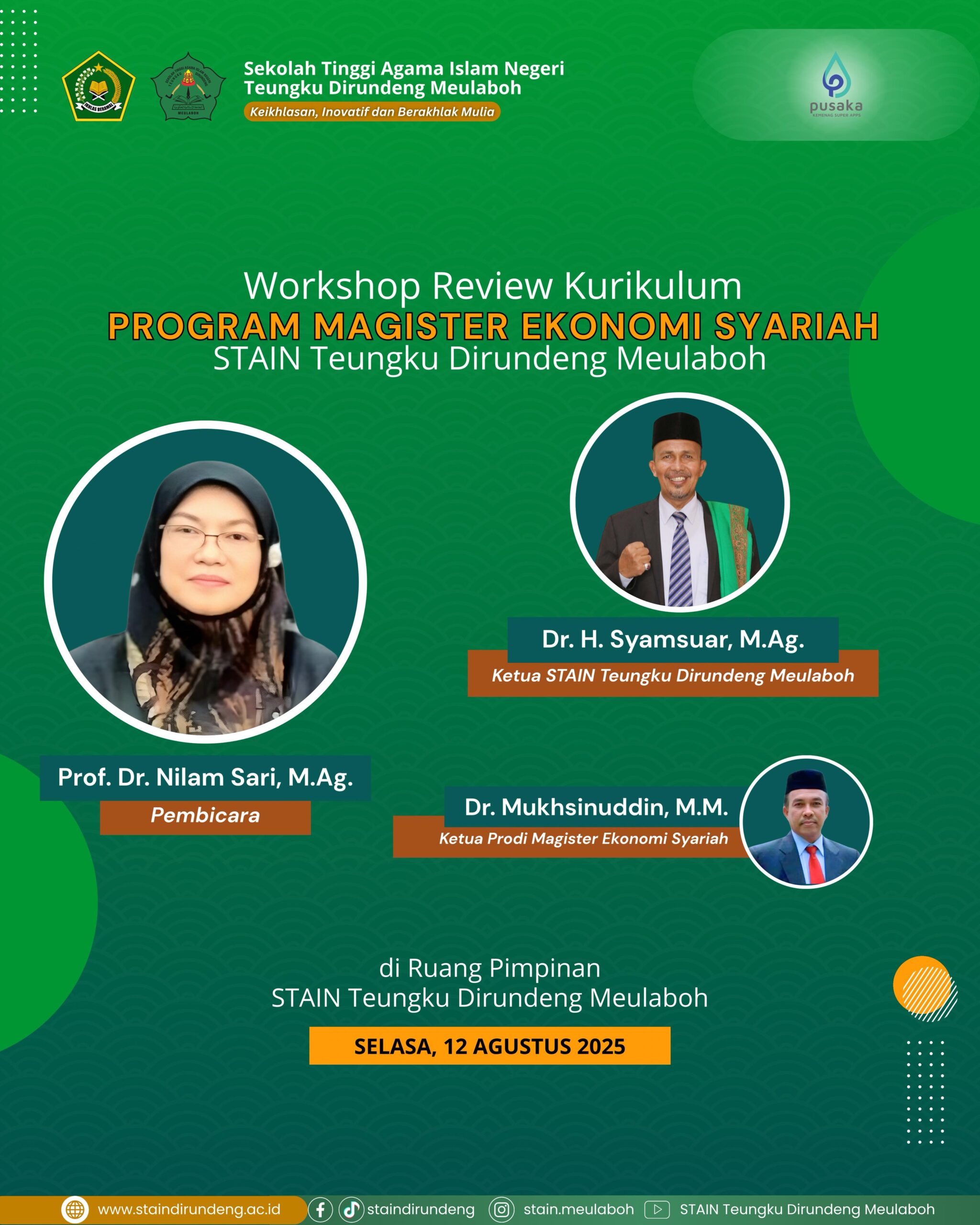
Sharia Economics [Doctoral]
Prof. Dr. Nilam Sari, M.Ag Serves as Curriculum Reviewer for the Master’s Program in Islamic Economics, STAIN Teungku Dirundeng Meulaboh
Banda Aceh, August 12, 2025 — The State Islamic Institute (STAIN) Teungku Dirundeng Meulaboh has reaffirmed its commitment to academic excellence through the organization of a Curriculum Review Workshop for the newly established Master’s Program in Islamic Economics (MES). This initiative marks a strategic step ahead of the inaugural semester of the program, which received its official operational license in 2025. The workshop featured keynote speakers Prof. Dr. Nilam Sari, M.Ag., Head of the Doctoral Program in Islamic Economics and Professor of Islamic Economics at the Postgraduate School of UIN Ar-Raniry Banda Aceh, and Dr. Helmi, M.Si., an academic from Teuku Umar University, both renowned experts in the field of Islamic economics.
In his remarks, Dr. Muhsinuddin, M.M., Head of the Master’s Program in Islamic Economics, highlighted that curriculum design is the heart of any study program. He emphasized that the curriculum serves not only as an academic guide but also as a determinant of graduate competencies. According to him, the establishment of the MES program responds to the urgent demand for human resources with profound analytical skills in Islamic economics and a strong grasp of global economic dynamics. Therefore, the involvement of experts and curriculum reviewers is crucial to ensuring that the program design is both contemporary and firmly rooted in Islamic values.
In her presentation, Prof. Dr. Nilam Sari underscored that Islamic economics curricula must integrate textual principles with contextual realities. She rejected the notion of treating Sharia merely as rigid rules without considering social, cultural, and technological developments. Drawing upon hermeneutic and phenomenological approaches, she argued that the curriculum should harmonize normative principles with the real needs of society. “Islamic economics education must be dynamic, relevant, and alive. We cannot simply repeat established knowledge; rather, we must reinterpret it in light of the spirit of maqashid al-sharia,” she affirmed.
Prof. Nilam also addressed challenges in the public understanding of Islamic economics, particularly within the banking and financial sectors. She observed that misconceptions persist, with some still viewing Islamic banking as a mere rebranding of conventional systems. She stressed that only through proper, structured education underpinned by a strong curriculum can these misconceptions be corrected. Graduates of the MES program are expected to serve as agents of change who will clarify such misunderstandings and provide innovative solutions to the economic challenges facing Muslim communities.
Meanwhile, Dr. Helmi, M.Si. emphasized that curriculum evaluation and enhancement must be an ongoing process. He noted that the rapid evolution of the national and global economy requires higher education to remain adaptive and responsive. He described the workshop as more than a formal agenda—an intellectual investment that will have long-term impacts on graduate quality and institutional reputation. He also commended STAIN Meulaboh’s bold initiative in launching a master’s program with a direct focus on strengthening Islamic economics through rigorous scholarship.
In his address, Dr. H. Syamsuar, M.Ag., Rector of STAIN Teungku Dirundeng Meulaboh, expressed pride in the establishment of the MES program, calling it a milestone achievement for the West-South Aceh community. He believes the program will become a driving force for Sharia-based economic development in the region, while also enhancing STAIN Meulaboh’s position as a global center of Islamic and economic studies. He further stressed the importance of developing innovative research that can support government and society in implementing financial systems free from usury and prohibited transactions.
Through this workshop, STAIN Teungku Dirundeng Meulaboh seeks to ensure that the MES curriculum embodies academic rigor, practical relevance, and a long-term vision. With the guidance of seasoned academics such as Prof. Dr. Nilam Sari and Dr. Helmi, the institution aspires to produce graduates who are not only experts in their field but also socially aware and capable of driving transformative change. This initiative underscores STAIN Meulaboh’s commitment to not merely providing education but also pioneering the transformation of Islamic economics for the benefit of Aceh, Indonesia, and the broader world.